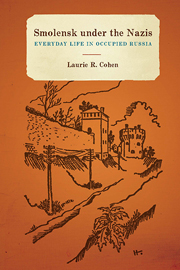Conclusion
Published online by Cambridge University Press: 05 December 2013
Summary
Occupation and Memory
In 1990 a Smolensk high school teacher decided to test the enduring effectiveness of the Great Patriotic War myth in silencing some of the war's critical aspects. He asked 150 students what the word “ghetto” meant. No one could give an appropriate answer. “The forgotten word has vanished from memory,” he wrote. “Remembering,” especially in the Soviet context, as Barbara Engel reminds us, “was dangerous.” Over the last two decades, however, the war has received much-needed international and critical attention, providing us more nuanced and comprehensive accounts, particularly in view of its extensive costs. More people, in short, have looked for and found more evidence as to what actually happened.
However, this situation is currently under threat by competing myths that are prompted by new politicized agendas of post-Soviet regimes (for instance, in Belarus, Ukraine, and Russia). Commemoration, remembrance, and memory politics of the war have thus begun to merge with growing geopolitical expediencies of nationalistic state building. As Geoffrey Eley writes, memory is currently being harnessed into a “political demand for recognition, now that the appeal of earlier collectivisms (feminism, the class-based identifications of the socialist tradition, a democratic ideal of citizenship per se) has become so unpersuasive and impaired.” Animosity toward “Moscow” as the cause of past suffering plays a key role. In Vladimir Putin's Russia, by contrast, it is again a myth of “victory” that is forcefully sustained.
- Type
- Chapter
- Information
- Smolensk under the NazisEveryday Life in Occupied Russia, pp. 265 - 270Publisher: Boydell & BrewerPrint publication year: 2013

